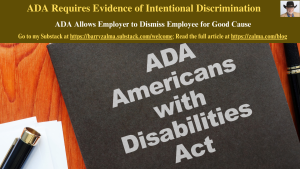ADA Requires Evidence of Intentional Discrimination

See the full video at https://rumble.com/v4ftbmk-ada-requires-evidence-of-intentional-discrimination.html and at https://youtu.be/5u3YkXMi8Qo
Post 4743
Jennifer Akridge appealed the entry of summary judgment for her former employer, defendant Alfa Mutual Insurance Company, on her claim brought under the Americans with Disabilities Act (“ADA”). Akridge contended that Alfa discriminated against her by terminating her to avoid paying healthcare costs related to her multiple sclerosis (“MS”) and severe migraines.
In Jennifer Akridge v. ALFA Insurance Companies, ALFA Mutual Insurance Company, No. 22-12045, United States Court of Appeals, Eleventh Circuit (February 16, 2024) the Eleventh Circuit applied the “but for test” to determine if the employer discriminated against a disabled employee.
FACTUAL BACKGROUND
Alfa responded that most of Akridge’s duties had become automated and her position was no longer needed Alfa eliminated it to cut business expenses. Alfa argued there was no evidence Alfa’s decisionmakers knew Akridge’s healthcare costs.
In 1989, Akridge began working at Alfa, an insurance company. In 1993, Akridge was diagnosed with MS and began suffering from severe migraines. By 2015, Akridge was promoted to a strategic coordinator position in Alfa’s auto underwriting department. Akridge’s primary task concerned the strategic underwriting program, in which she worked with Alfa’s agents and district managers to identify profitable policies for struggling agents. By all accounts, Akridge excelled at her job, with excellent performance reviews.
Alfa was self-insured and paid the healthcare costs of its employees. Akridge estimated that it cost Alfa between $10,000 and $12,000 per month to treat her MS and migraines. While it was common knowledge at Alfa that Akridge had MS, no one at Alfa ever said anything to Akridge about her healthcare costs.
Decisionmakers and the Decision to Terminate Akridge
The decisionmakers discussed eliminating Akridge’s position for one to two weeks before her termination.
Summary Judgment and First Appeal
Ultimately, the court entered summary judgment in favor of Alfa. The court observed that none of Akridge’s evidence indicated that the decisionmakers knew her individual healthcare costs.
Second Summary Judgment Motion
Alfa filed its second motion for summary judgment, which the court granted. The court concluded that (1) while Akridge was fired and not transferred to a new position, she admitted she never applied to an open position at Alfa and (2) the decisionmakers testified that they were unaware of Akridge’s healthcare costs.
The ADA bars employers from discriminating against a qualified individual on the basis of disability. On appeal, Akridge challenges the entry of summary judgment on her claim that Alfa discriminated against her by terminating her to avoid paying her high healthcare costs.
An ADA plaintiff establishes a prima facie case by showing (1) she has a disability; (2) she is a qualified individual under the ADA; and (3) the employer discriminated against her “on the basis of disability.” The ADA imposes a “but-for” causation standard-that is, an adverse employment action would not have occurred but for the plaintiff’s disability.
The Supreme Court has instructed that the ancient and simple “but for” common law causation test supplies the rule against which Congress is normally presumed to have legislated, including for federal antidiscrimination laws.
The employee-friendly, motivating-factor standard does not apply to ADA claims, as this standard is drawn directly from the text of Title VII. Akridge cannot resort to the lesser showing. The ADA’s text requires a plaintiff alleging disparate treatment to prove that she was treated less favorably than a similarly situated, non-disabled person.
Akridge’s Evidence does not Show Pretext
Alfa’s decisionmakers eliminated Akridge’s position to reduce business expenses because her position was no longer needed. Alfa produced non-discriminatory reasons for her termination. Alfa’s interest in reducing expenses was supported by the development of Guidewire.
Akridge also failed to present evidence indicating that Alfa’s reasons for her firing were pretextual. In short, Akridge has failed to present evidence that would allow a jury to infer intentional disability discrimination.
If Congress intended to retain, clarify, or add the motivating-factor standard to the ADA, it could have simply added that language, like it did in its 1991 amendments to Title VII. Instead, and in direct contrast to Title VII, Congress chose to not add the motivating-factor language to the text of the ADA. The grant of summary judgment in favor of Alfa and the sanctions award of $1,918 against Akridge were affirmed.
Every employer has faced the need to dismiss an excellent employee because the work the employee was doing was no longer needed by the employer. When the employee is disabled the Americans With Disabilities Act will be raised to say that the reason for the dismissal was to avoid paying her extensive medical bills. She failed to provide any evidence that the dismissal was for any reason that fell within the discrimination requirement of the ADA. Since Alfa had a good business reason for the dismissal and had no knowledge of her medical costs, the summary judgment was affirmed.
 (c) 2024 Barry Zalma & ClaimSchool, Inc.
(c) 2024 Barry Zalma & ClaimSchool, Inc.
Please tell your friends and colleagues about this blog and the videos and let them subscribe to the blog and the videos.
Subscribe to my substack at https://barryzalma.substack.com/publish/post/107007808
Go to Newsbreak.com https://www.newsbreak.com/@c/1653419?s=01
Go to X @bzalma; Go to the podcast Zalma On Insurance at; Go to Barry Zalma videos at Rumble.com at https://rumble.com/c/c-262921; Go to Barry Zalma on YouTube- https://www.youtube.com/channel/UCysiZklEtxZsSF9DfC0Expg; Go to the Insurance Claims Library – http://zalma.com/blog/insurance-claims-library.
Please tell your friends and colleagues about this blog and the videos and let them subscribe to the blog and the videos.
Go to X @bzalma; Go to Newsbreak.com https://lnkd.in/g8azKc34; Subscribe to my substack at https://lnkd.in/gcZKhG6g
Go to the Insurance Claims Library – https://lnkd.in/gwEYkxD.
Like this:
Loading…







